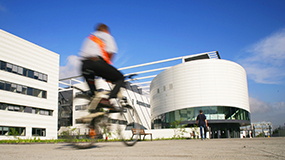 Recherche
Recherche
Laboratoires.Ecoles, Collège et Formation doctorales
Stratégie. Séminaires, colloques. Sciences et société
Réseaux et pôles d'excellence. Investissements d'avenir (Labex)
Summer School on CPS 2014
7 juillet 2014 ... 10 juillet 2014
Université Joseph Fourier, PERSYVAL-Lab, and NASA-JPL are organizing the second edition of the Cyber-Physical Systems Summer School.
The broad objective of the CPS Summer School is to explore the manifold relationship between networked embedded systems ("the internet of things") and humans as their creators, users, and subjects.
The format of the Summer School is a four days meeting, organized around different aspects of rigorous engineering of Cyber-Physical Systems.
Bernard Tourancheau / Persyval-Lab
The Internet of Things (IoT) is the new IT paradigm for the 2010's decade. It promises a huge growth of the number of interconnected devices, more than 50 Billions by 2020 says Ericsson studies. Regarding the (upcoming ?) energy crisis this will only happen if the devices' energy consumption is very low. Moreover, IoT devices are mostly supposed to be autonomous for years. Such a system supposes batteries and/or energy scavenging from the environment, which also bets for very low energy devices. In this talk, we present several aspects of our works that tries to reduce as much as possible the energy consumption of small devices' communications while involved in the IoT. This includes research efforts from the hardware design to the system architecture and lots of software optimizations, feasibility studies, as well as new protocols in the networking stack.
Bernard Tourancheau got a MSc. in Apply Maths from Grenoble University in 1986 and a MSc. in Renewable Energy Science and Technology from Loughborough University in 2007. He was awarded best Computer Science PhD by Institut National Polytechnique of Grenoble in 1989 for his work on Parallel Computing for Distributed Memory Architectures. Working for the LIP laboratory, he was appointed assistant professor at Ecole Normale Supérieure de Lyon in 1989 before joining CNRS as a junior researcher. After initiating a CNRS-NSF collaboration, he worked two and half years on leave at the University of Tennessee on a senior researcher position with the US Center for Research in Parallel Computation at the ICL laboratory. He then took a Professor position at University of Lyon in 1995 where he created a research laboratory and the INRIA RESO team, specialized in High Speed Networking and HPC Clusters. In 2001, he joined SUN Microsystems Laboratories for a 6 years sabbatical as a Principal Investigator in the DARPA HPCS project where he lead the backplane networking group. Back in academia he oriented his research on sensor and actuator networks for building energy efficiency at ENS LIP and INSA CITI labs. He was appointed Professor at University Joseph Fourier of Grenoble in 2012. Since then, he is developing research at the LIG laboratory Drakkar team about protocols and architectures for the Internet of Things and their applications to energy efficiency in buildings. He as well continue HPC multicores GPGPU's communication algorithms optimization research and renewable energy transition vs peak oil scientific promotion. He has authored more than a hundred peer-reviewed publications* and filed 10 patents**.
*http://scholar.google.com/citations?hl=en&user=1QNEeL8AAAAJ
**http://www.patentbuddy.com/Inventor/Tourancheau-Bernard/11609171#More
Mots clés : persyval-lab
Informations
- Gricad Vidéos
- 1 janvier 2021 00:00
- Conférences
- Français

